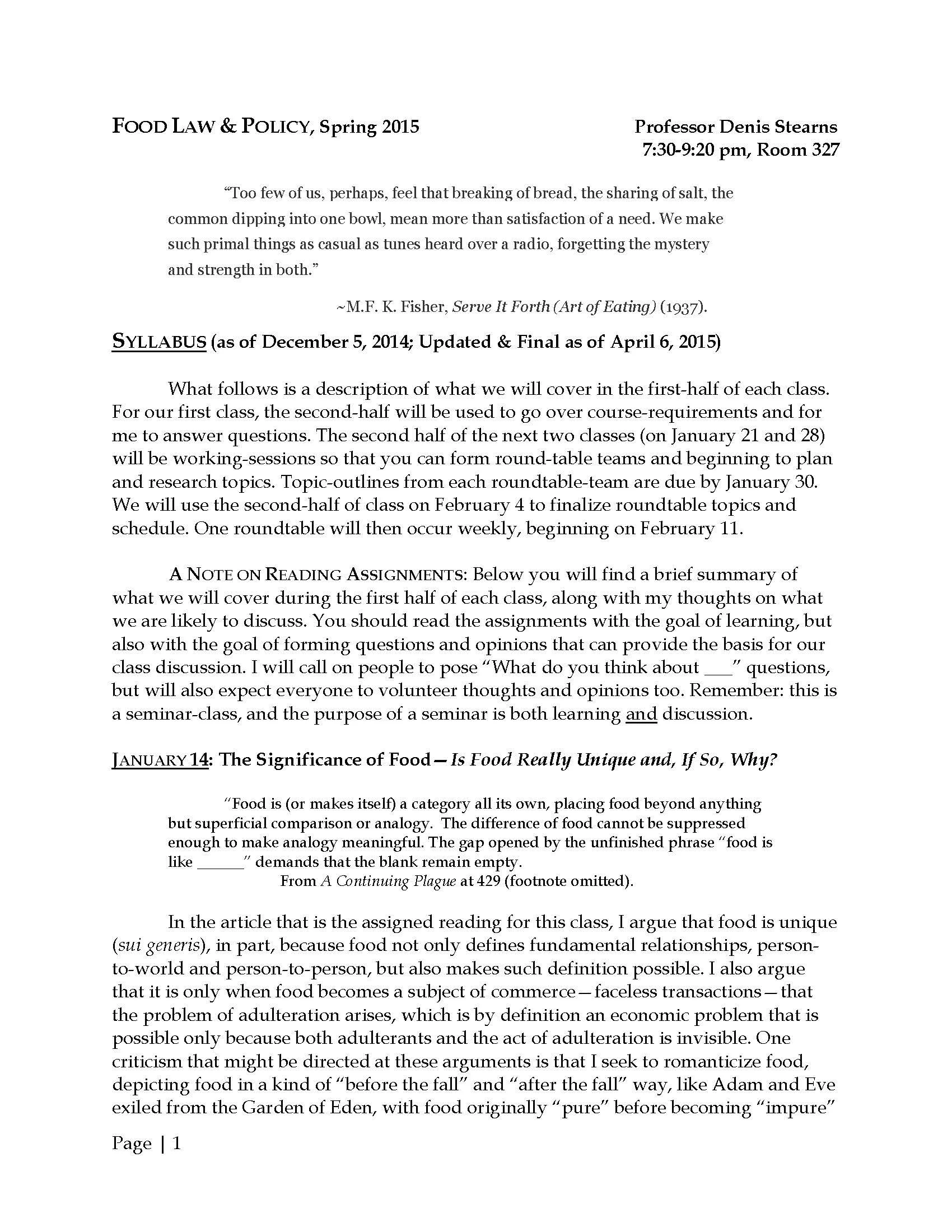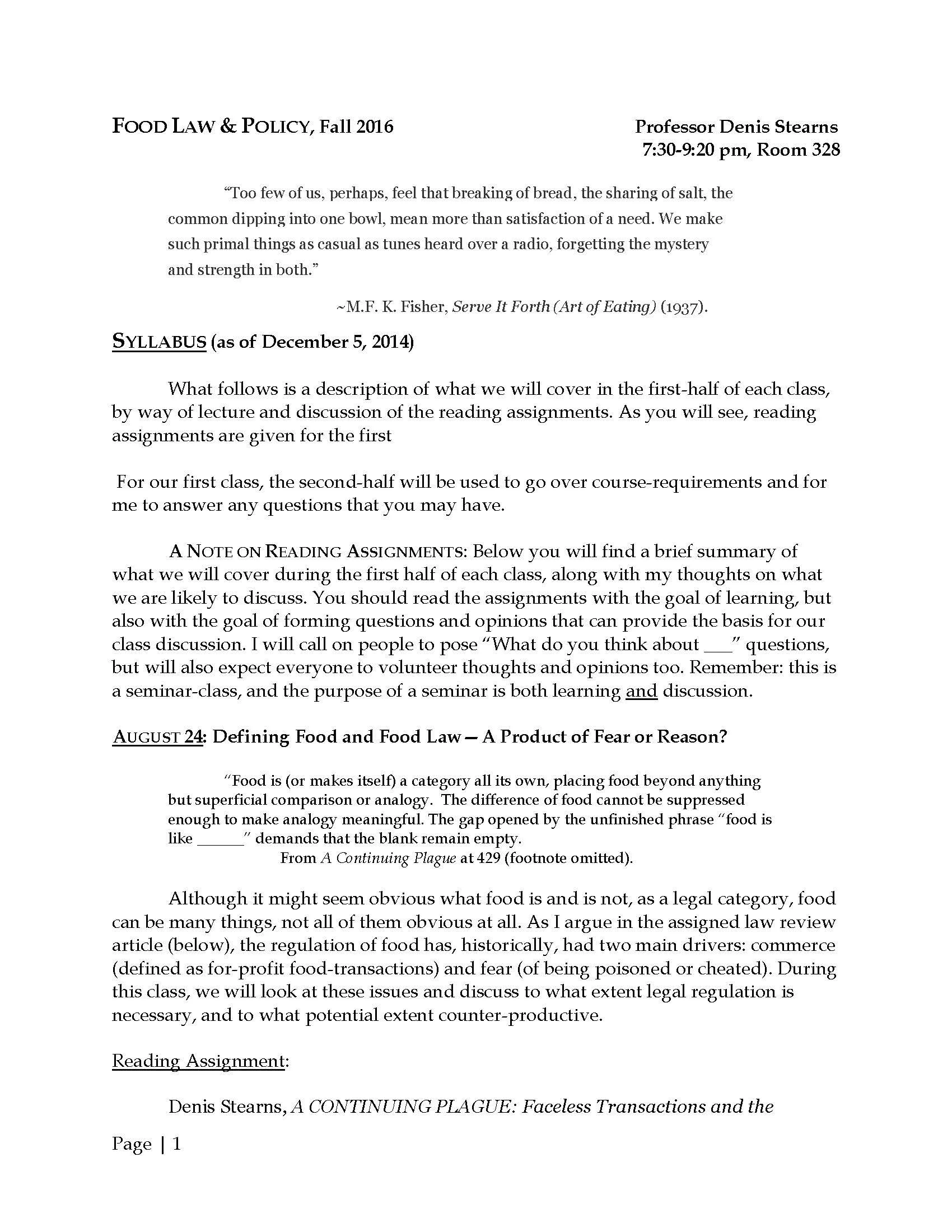An artisanal law firm based in beautiful Port Townsend. Created by attorney and law professor, Denis Stearns, to provide real-world solutions to a wide range of challenges on behalf of businesses, non-profit organizations, and injured persons.

An artisanal law firm based in beautiful Port Townsend. Created by attorney and law professor, Denis Stearns, to provide real-world solutions to a wide range of challenges on behalf of businesses, non-profit organizations, and injured persons.

Searching online for information can be overwhelming, especially when you are not quite sure what you are looking for, or even what you need to know. This page is a kind of library of information and resources, on a wide variety of topics, including articles that Denis has written for publication.
Abstract:
Despite knowledge that commerce in food is a profit-driven enterprise, the public has consistently put great faith in the wholesomeness and safety of the food being purchased. To some extent, such faith is necessary, even if not always justified. In making the decision to put a bite of food in one’s own mouth, or the mouth of a friend or family member, a form of faith or trust must accompany the act of eating. For who would knowingly eat food suspected to be unsafe? But that is precisely what millions of people do every year, with a great many of them falling ill as a result. It is true that only a small minority of those made ill ever learn what particular food item was the cause and what particular manufacturer was responsible. It is, however, no secret that food, in general, is a significant cause of illness each year, and is not as safe as it could be if made with greater care under more effective and transparent regulatory oversight. And it is precisely because food both could be safer, and is so often found to be unsafe, that the dynamic of concealment and revelation so inevitably leads to either denial or despair on the part of the public, with “consumers often feel[ing] powerless with reference to avoiding food safety problems.”
Abstract:
Approximately fifty-years ago, the American Law Institute published Section 402A of the Restatement (Second) of Torts, the rule of strict liability in tort for all products that are in a defective condition unreasonably dangerous to the user. This rule would lead to a “revolution” in tort law, giving rise to products liability as a distinct field of law. What is rarely acknowledged, however, is that the first version of Section 402A promulgated was a “special rule” that applied only to food. For several decades, prior to the promulgation of this “special rule,” courts had worked out rules and rationales to justify the creation of a remedy for those injured by unsafe food products, a remedy that was available despite contract rules that would have otherwise prevented any recovery, like the rule of privity and doctrine of caveat emptor. With the courts having recognized an implied warranty of quality for food, tort scholars began to argue in favor of strict liability for all defective products, with the right to recover springing from tort not contract. Using his influence as both a leading torts scholar, and as the Reporter for the Restatement (Second) of Torts, William Prosser was able to build the necessary consensus to extend the special rule for food to “intimate bodily products,” and then all products, leaving the special rule for food behind. This article will examine Prosser’s effort in light of his own scholarship and writing, especially his classic articles, The Assault on the Citadel and The Fall of the Citadel, articles that were modeled in style after turn-of-the-century boys-adventure stories, which had in jingoistic terms extolled the virtue of empire-building. Among other things, this article will depict Prosser’s efforts as an ultimately imperialistic enterprise, an effort to advance and expand the scope of that which tort law could control. But with tort law forgetting food, the rules of product liability were doomed to theoretical incoherence, and left vulnerable to a predictable anti-consumer backlash. This article concludes with a defense of the centrality of food to law, and the need for special rules for food, while also surveying the damage done to food safety by the law having forgotten about food for so long.
Abstract:
Two decades ago this year, the Jack in the Box E. coli outbreak, in which five victims died, and hundreds more were seriously injured, dramatically changed the way the world looked at food and food safety. Although deemed “trivial” by tort scholars, who nonetheless used legal doctrines first developed in food cases to justify the extension of strict liability to all products, this article uses the Jack in the Box outbreak as a point of departure for exploring not only the relationship between food, being, and knowledge, but to posit that commerce in food, and the inevitability of profit-motivated food adulteration, are central to the presumed need for regulation of quality. What this presumption ignores, however, is that regulation creates the possibility of large-scale food systems in which the anonymity and invisibility necessary to food adulteration can occur. When food is manufactured and marketed on a smaller, more local scale, especially as a by-product of a community’s efforts to feed itself, there is no corresponding need for regulations because the expectations of a quality become largely self-enforcing. It is only when food-production becomes external to community, and the subject of faceless transactions, that the need for regulation appears to be imperative. This regulatory imperative is also facilitated by a modern conception of products as that which exist independent of any “real” maker, a conception that is undermined if food is used as a means of critique. Finally, looking at how the relations and interactions of people can be described as falling along a spectrum from the face-to-face to the faceless, and at the relation of people to products (especially food products), the article concludes with the bold claims that (1) law makes food less safe by facilitating commerce and thus anonymity in the market, and (2) the effectiveness law should be judged by how well it facilitates community and, as a result, makes law less apparently needed, not more.
Abstract:
Most critiques of regulation are premised on the concepts of “free markets” and “market failures” as justifying, or not, the need for government interventions and control of the marketplace. Using the market for food as an example, this article questions not only the possibility of a buyer being a free actor when buying food, but also whether it is meaningful to speak in terms of a “free” market at all. One centerpiece of this questioning is the author’s coining of the term “(cr)edibility” to stand for the twinned ideas of credibility and edibility as defining the nature of all commercial food exchange. It is “(cr)edibility” that consumers seek in the food that they buy and eat, but it is just this “(cr)edibility” that the market can never deliver; this is the real “market failure” that must be understood when examining market for food.
This article additionally interrogates the idea of food safety by opening the question of whether a rational economic actor in a free market for food can reasonably be expected to invest in improving the safety of the food products he makes and sells. It is precisely the lack of (cr)edibility in the market—i.e., the absence of reliable quality signals, the lack of traceability, the high degree of anonymity, and the destruction of trust—that creates the structural impediments and powerful disincentive for improving the quality and safety of food.
Using a series of case-studies taken from the author’s practice as an attorney who represents the victims of foodborne illness, including outbreaks related to Salmonella in peanut butter and E. coli OI157:H7 in bagged spinach, the author concludes the article by offering some thoughts on proposed core values that, if somehow made an essential or defining part of the market for food, would go far in making food in the United States, if not (cr)edible, at least much safer to eat.
Key Words: food safety foodborne illness, market failure, regulation, free market, E. coli O157:H7, Salmonella, credibility, anonymity, traceability
Abstract:
Rendered Stateless: The Extraordinary Apprehension of Foreign Nationals and the Politics of Exclusion, 10 Wis. Int’l L. J. 78 (Fall 1991). (Winner of the Quackenbush Award for the Best International Law Journal Article of the year.)

Food Safety News is a leading website reporting on food safety, food law and policy, and all things food related. Created and sponsored by Marler Clark, the Food Safety Attorneys.

2015 Syllabus, Page One (for entire Syllabus see Link below).

PPT Presentation for 2015 Class No. 2 (for entire PPT see Link below)

PPT Class No. 14: Rise and Application of Strict Liability in Food Cases

2016 FL&P Course Syllabus (for entire Syllabus see Link below)